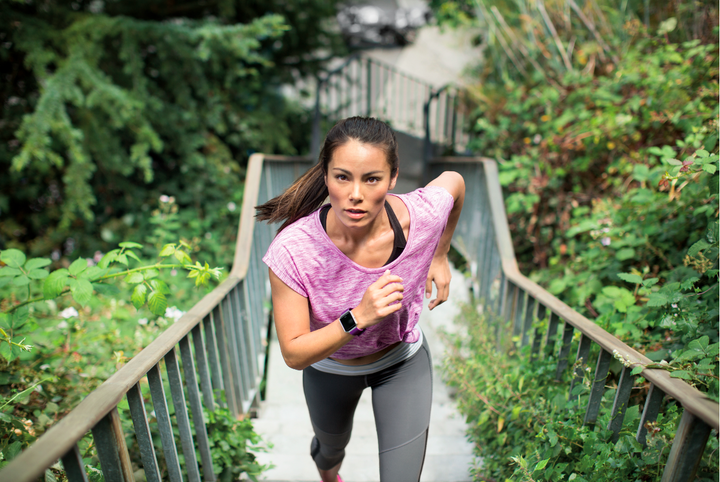
Fitbit
During all hours of the day, Fitbit wristbands monitor people’s steps, heart rate, sleep, calories burned, and more. This continuous tracking has made them useful not only for fitness fanatics, but also potentially for scientists who want a constant and close-up view of people’s health.
Today, Fitbit revealed just how often scientists have consulted activity-trackers in their research. Over the last four years, researchers have published more than 200 studies based on more than 2 billion minutes of Fitbit data. (Those numbers are according to both Fitbit and Fitabase, a platform that collected the devices’ data on behalf of scientists.)
Fitbit is highlighting its relationship with the scientific community at a time when the CEO has said he wants to go beyond fitness-tracking and push deeper into health care, an area that comes with potential regulatory risks.
Traditionally, researchers rely on study participants to self-report some information about themselves to get a sense of their health in everyday life. But people can inadvertently report the wrong information, or forget to keep track altogether. The potential benefit of Fitbit devices, according to the company, is that they can remove subjectivity from the data. They’re also easy to wear and relatively inexpensive.
“When a wearable device like this simply just captures the number of steps they’re taking in a given day, that’s a pretty important parameter.”
“The way we’d normally have to ask [for health information] is, you see people in the clinic every week or couple of weeks, [and] you ask them how they were,” Dr. Kevin Patrick, a UC San Diego family medicine and public health professor who researches health-behavior management, told BuzzFeed News. “When a wearable device like this simply just captures the number of steps they’re taking in a given day, that’s a pretty important parameter.”
Patrick, who says he has no financial ties to Fitbit or Fitabase, plans to use Fitbit in four to five upcoming studies, including one that will track activity levels in cancer patients.
Scientists are still in the early stages of exploring how to incorporate the popular wearables into their work. As examples of Fitbit’s influence on research, the company in its press release cited a 2015 letter to the editor of the International Journal of Cardiology. After outfitting 23 adults with Fitbit devices, the authors concluded that they could be “an accurate, reliable, and efficient tool for physicians to track the adoption/maintenance of physical activity programs and support their patient’s attempt at an active lifestyle.”
Another 2015 study highlighted by the company, this one in The American Journal of Preventive Medicine, suggested that people can be reliably expected to wear a Fitbit for research purposes. It reported that 51 women who underwent a 16-week fitness regimen wore their Fitbits 95% of the days.
However, there are some caveats to how much confidence scientists can place in Fitbit. A Fitbit tracker is officially a consumer product, not a medical or scientific device that meets the rigorous standards of the US Food and Drug Administration. The company does not publicly share the algorithms its devices use to generate data, and Fitbit doesn’t reveal the study results that it says validate its algorithms’ accuracy.

Fitbit CEO James Park
Steve Jennings / Getty Images for TechCrunch
But Fitbit CEO James Park has hinted that he’d like the company to push further into medical technology, an area more prone to FDA scrutiny. “We’re not there yet,” Park told Bloomberg in April. “But we think five to 10 years down the line, the power of these devices to help consumers, health-care providers, the whole health-care ecosystem track and give diagnoses to people — I think it’s incredibly tantalizing.”
More studies using Fitbit devices are in the works, the company says. Researchers from Northwestern University and UC San Francisco want to monitor patient activity before and after spine surgeries to understand how quickly they recover. Separately, UCSF is also exploring if physical activity can reduce patients’ likelihood of becoming hospitalized before getting a liver transplant. And an Arizona State University researcher is using Fitbit data in part to see if getting customized wellness tips will nudge people to adopt healthy habits.
“Fitbit’s consumer-friendly technology provides our customers with an accurate, meaningful way to capture 24/7, real-time data and design innovative study protocols in ways not possible before,” Fitabase CEO Aaron Coleman in a statement.
Outside the academic community, of course, plenty of people have made discoveries about their own bodies by way of their activity trackers — like the fact that they’re pregnant, when they’re most fertile, and the exact moment they felt heartbreak.
from BuzzFeed - Tech https://www.buzzfeed.com/stephaniemlee/fitbit-scientific-research?utm_term=4ldqpia
No comments:
Post a Comment